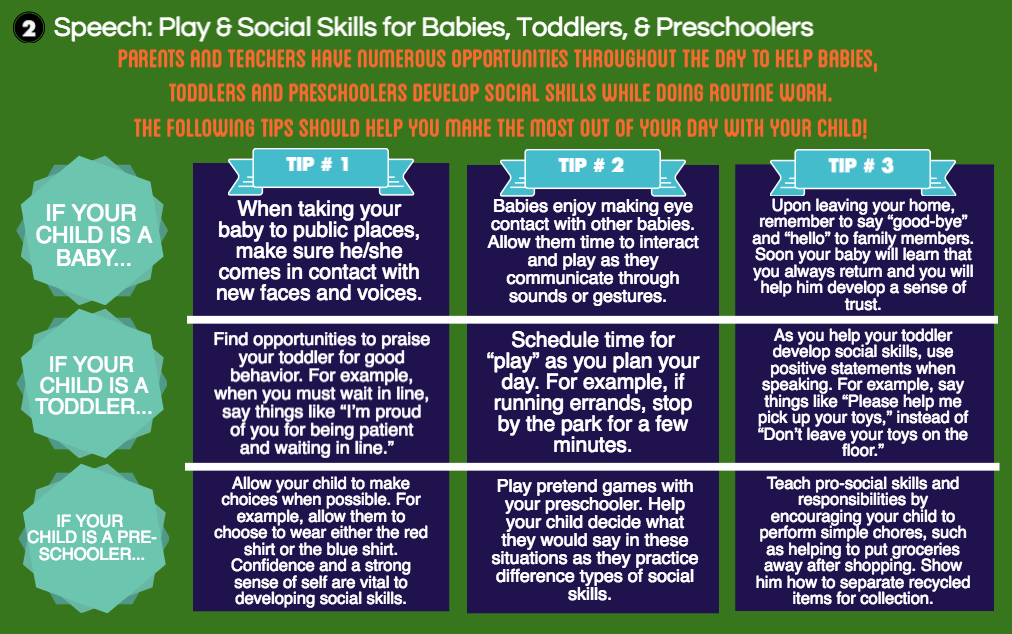Play & Social Skills Tips for Babies, Toddlers, & Preschoolers
Solitary Play. Play, without regard to the involvement of other children in the room or playground. A child may build a tower with blocks, yet be oblivious to other nearby children.
· Character Play. As the child plays, they observe other children in the same area. Often this child will begin to model their play on another child. After watching another child, they may alter their own play. Even though they may appear to show little interest, they are observing others.
· Parallel Play. A form of play where several children are playing with the same materials, but each is playing separately: Using puzzles, for example. They may converse with others, but work independently. If one leaves the group, the play continues.
· Associative Play. Play in which a loosely organized game is decided upon. For example, children may run around the room, pretending to be airplanes. There are no definite rules or roles. If one child decides not to play, the others continue.
· Cooperative Play. Play in which children assume assigned roles and depend on others for achieving the goals of the play. For instance, if children want to play “house,” they need others to participate in the roles of one or more parents and several children. If one of the key players decided to drop out, the play episode will end.
Parents and teachers have numerous opportunities throughout the day to help babies, toddlers and preschoolers develop social skills while doing routine work.
If your child is a baby:
- When taking your baby to public places, he comes in contact with new faces and voices.
- Babies enjoy making eye contact with other babies. Allow her time to interact and play as they communicate through sounds or gestures.
- Upon leaving your home, remember to say “good-bye” and “hello” to family members. Soon your baby will learn that you always return and you will help him develop a sense of trust.
If your child is a toddler:
- Find opportunities to praise your toddler for good behavior. For example, when you must wait in line, praise the child for being patient. Say things like “I’m proud of you for being patient when we must wait in line.”
- Schedule time for “play” as you plan your day. For example, if running errands, stop by the park for a few minutes.
- As you help your toddler develop social skills, use positive statements when speaking. For example, say things like “Please help me pick up your toys,” instead of “Don’t leave your toys on the floor.”
If your child is a preschooler:
- Allow your child to make choices when possible. For example, allow her to choose to wear either the red shirt or the blue shirt. Confidence and a strong sense of self are vital to developing social skills.
- Play pretend games with your preschooler. If you’re been to the grocery store, pretend to be the cashier or the produce person. Help your child decide what they would say in these situations as they practice difference types of social skills.
- Teach pro-social skills and responsibilities by encouraging your child to perform simple chores, such as helping to put groceries away after shopping. Show him how to separate recycled items for collection.
Stimulating Play Items
The following toys grow with your child and can provide a longer learning time:
- Blocks (variety of sizes)
- Boxes (several shapes)
- Large beads and string
- Puzzles (wooden or board)
- Sand, sifters, cups and spoons
- Water and small cups
- Play dough
- Dress up clothes and costumes


